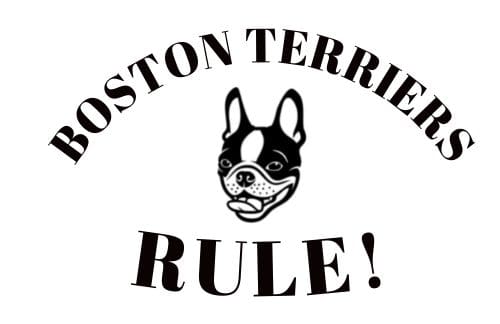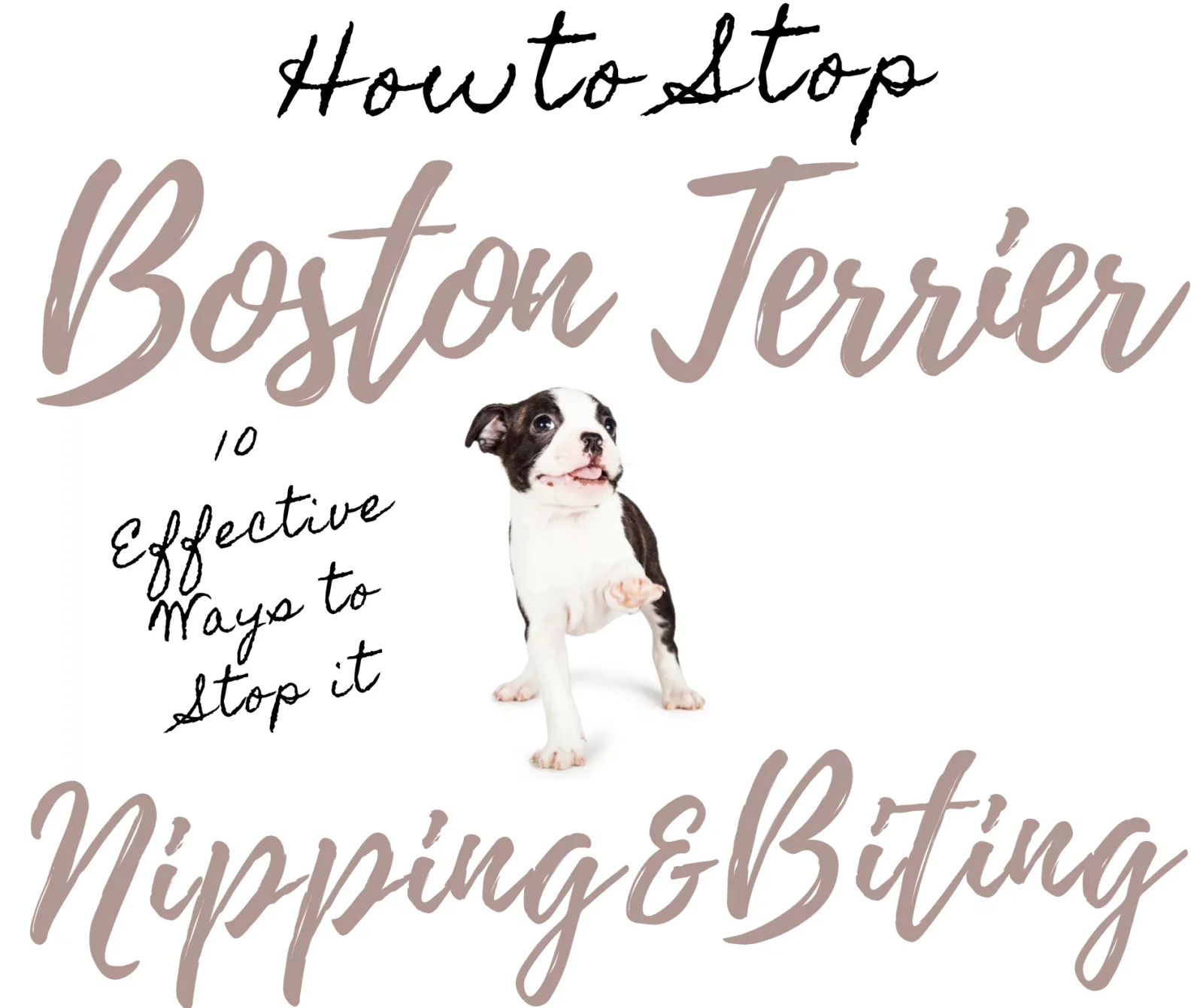Introduction
Boston Terriers are known for their friendly and lively personalities, but just like any other breed, they may exhibit nipping and biting behaviors, especially during their puppy stages. Understanding why Boston Terriers do it, whether it’s common for the breed, and effective ways to stop this behavior is essential for a harmonious relationship with your loving pup. In this article, we’ll provide you with a comprehensive guide on how to tackle Boston Terrier nipping and biting issues. If you are interested in learning about other Boston Terrier behavioral issues, click here.
1. Understanding Reasons for Biting
Boston Terrier puppies, like many other breeds, explore the world through their mouths as part of their natural and instinctual behaviors. This inquisitive tendency is driven by several key factors that help us better understand why puppies use their mouths as their primary tool for discovering their surroundings.
Sensory Exploration:
Puppies have a heightened sense of curiosity, and their mouths provide a direct means of experiencing different textures, temperatures, and tastes. Much like how human babies put objects in their mouths, Boston Terrier puppies use this approach to gather sensory information about the world. They learn about the world through touch, taste, and smell, and this oral exploration helps them grasp the characteristics of objects and people they encounter.
Teething Discomfort:
Another significant reason puppies exhibit a strong inclination to use their mouths is related to teething. Boston Terrier puppies, like all puppies, undergo a teething process as their baby teeth fall out and are replaced by permanent ones. Teething can be uncomfortable and at times painful for them, and they often find solace in chewing and gnawing on objects. This is a way to alleviate the discomfort associated with the growth of new teeth and soothe their sore gums. As a result, they may be particularly prone to nipping and biting during this phase.
Learning About Limits:
While exploring the world through their mouths, puppies are also learning about limits and consequences. When they nip or bite too hard during play or interaction, they receive feedback from their littermates or, in a human context, their owners. This feedback helps them understand the thresholds of acceptable behavior and teaches them bite inhibition—the ability to control the force of their bite.
Understanding that Boston Terrier puppies explore the world through their mouths allows us to approach their nipping and biting tendencies with empathy and patience. It is essential to acknowledge that this behavior is a natural part of their development, and with the right guidance, training, and positive reinforcement, these playful puppies can learn to control their nipping and biting as they grow into well-mannered adult dogs.
Nipping and biting, while often seen as playful behavior, can also serve as a means of communication for Boston Terrier puppies, particularly to express their excitement and enthusiasm. Understanding the underlying motivations and cues for this behavior is crucial in addressing it effectively.

Playful Interaction:
Nipping and biting during play is a common way for Boston Terrier puppies to engage with their littermates and, in a home setting, with their human family members. It’s important to recognize that this behavior is typically not driven by aggression, but rather by the desire to interact and have fun. During playtime, puppies may engage in mock battles, chase one another, and use their mouths to engage in what they perceive as harmless roughhousing. This behavior is often accompanied by wagging tails, play bows, and excited barks.
Expression of Joy and Excitement:
For Boston Terrier puppies, nipping and biting can also be a way to convey their excitement and happiness. When puppies are thrilled or overjoyed, they may exhibit this behavior as an outlet for their exuberant energy. This form of expression is common when they greet their owners after a brief separation, receive affection, or anticipate enjoyable activities, such as a walk or playtime at the park.
Communication of Discomfort:
While nipping and biting are typically associated with play and excitement, they can also be used as a means of communication when a puppy is uncomfortable or anxious. In such situations, a Boston Terrier may gently nibble or nip to express their unease or to seek reassurance from their owners. It’s essential to pay attention to the context in which this behavior occurs to determine whether it’s motivated by joy or discomfort.
A Method for Connection:
Boston Terriers are known for their affectionate nature, and nipping can be a way for them to feel more connected with their human companions. By engaging in light nipping, they seek physical closeness and a sense of bonding. This behavior often arises during moments of relaxation and cuddling.
Recognizing that nipping and biting can be expressions of playfulness and excitement is the first step in addressing and redirecting this behavior. While these actions may be well-intentioned, it’s crucial to ensure that they are directed appropriately and do not lead to unintentional harm or discomfort. Owners should establish boundaries and teach bite inhibition to help their Boston Terrier puppies understand the difference between acceptable and unacceptable nipping. Consistent training, positive reinforcement, and socialization are key elements in fostering a well-behaved and socially adept adult Boston Terrier.
Sometimes, puppies nip during teething to alleviate discomfort.
Boston Terrier puppies, like their canine counterparts, go through the teething phase as they grow and develop. This phase typically begins around three to four months of age and may last until they are six months old or slightly longer. During this period, puppies experience discomfort and irritation in their mouths as their baby teeth fall out, and adult teeth grow in. Consequently, nipping and biting can become more pronounced as a way for them to alleviate this discomfort.
Here’s a closer look at how teething influences nipping behavior and some effective strategies to help alleviate it:
Teething Discomfort:
Teething in Boston Terrier puppies can be a challenging time for both the pup and their owners. The process involves the shedding of their baby teeth and the emergence of adult teeth, which can be uncomfortable and sometimes painful. To ease this discomfort, puppies may instinctively turn to nipping and biting as a way to soothe their irritated gums. The pressure of gnawing on objects or gently nipping on hands or other items provides a counter pressure that can relieve some of the discomfort associated with teething.
Appropriate Chew Toys:
One effective way to manage nipping during teething is to provide appropriate chew toys. Durable and safe chew toys designed for teething puppies can be particularly helpful. These toys are often made of materials that provide relief by allowing the pup to chew and apply pressure to their gums. Freezeable toys, such as the ones seen here, can also be beneficial, as the coldness can further soothe the irritated areas. By offering alternative outlets for their need to chew, you can redirect your Boston Terrier puppy’s nipping tendencies away from human skin and belongings.
Cold Compresses:
In addition to chew toys, cold compresses can provide relief during the teething phase. Dampen a clean cloth or soft toy, place it in the freezer until it’s adequately cold (but not frozen), and then offer it to your puppy. The coldness helps numb their gums and alleviate discomfort. It’s important to supervise your puppy when using cold compresses to ensure their safety and prevent overuse.
Teething Gels and Pain Relief Products:
Some teething gels and pain relief products specially formulated for puppies can be used to alleviate teething discomfort. Consult your veterinarian to ensure you choose a safe and effective option. These products can be applied directly to your puppy’s gums as directed.
Training and Redirecting Behavior:
While it’s important to provide comfort during teething, it’s equally essential to teach bite inhibition and proper manners. When your Boston Terrier puppy nips, gently redirect their attention to an appropriate chew toy. Use positive reinforcement techniques to reward them when they chew on the toy rather than nipping people or belongings. Over time, your pup will learn to associate biting toys with relief and positive outcomes.
Maintain Consistency:
Throughout the teething phase, maintain consistency in your training and provide a variety of teething solutions to accommodate your puppy’s preferences. Be patient and understanding, as this phase is temporary, and most Boston Terriers grow out of nipping as their adult teeth come in and their discomfort subsides.
By recognizing the connection between teething discomfort and nipping behavior, owners can take proactive steps to alleviate their puppy’s discomfort while teaching them appropriate biting habits. With proper guidance and consistent training, Boston Terrier puppies can navigate the teething phase more comfortably and grow into well-mannered adult dogs.

2. Is Biting Common for Boston Terriers?
Boston Terriers are beloved for their distinctive tuxedo-like markings and lively personalities. It’s important to understand that nipping and biting, especially during puppyhood, are common behaviors among many dog breeds, including Boston Terriers. Their natural exuberance and playful nature can lead to this behavior, particularly when they’re young and full of energy.
Here’s a closer look at why nipping and biting tendencies are prevalent in Boston Terrier puppies and how this behavior evolves as they mature:
Playful Nature:
Boston Terriers are renowned for their playful and spirited personalities. They often engage in interactive play with family members, which includes nipping and biting as part of their playtime activities. This form of play helps them develop their physical coordination, social skills, and communication with other dogs and humans. While their nipping behavior might be instinctual, it’s usually not driven by aggression but rather a way to engage with their environment.
Curbing the Behavior:
While nipping and biting are common during a Boston Terrier’s puppy stage, they can be taught bite inhibition and appropriate play manners through training and consistent guidance. With proper techniques and patience, owners can help their puppies understand that this behavior is unacceptable when interacting with people.
Social Interaction:
In a litter of Boston Terrier puppies, nipping and biting are a part of their social interaction. They use this behavior to establish hierarchies and boundaries among their siblings. Learning how to communicate and inhibit their bite force during these interactions is an essential part of their early development.
Patience and Training:
To address this common behavior, it’s crucial for Boston Terrier owners to be patient and understanding during the puppy phase. Professional training, socialization, and positive reinforcement methods are highly effective in teaching puppies how to interact appropriately without resorting to nipping and biting.
Adult Behavior:
As Boston Terrier puppies grow and mature, they tend to outgrow this behavior naturally. Their playfulness remains a defining trait, but their increased understanding of social norms and boundaries makes them less likely to nip or bite during play. However, proper training during their puppyhood is still essential to ensure this transition into adulthood is smooth and safe for both the dog and their owners.
Breed-Specific Characteristics:
It’s important to recognize that while nipping and biting are common puppy behaviors, each Boston Terrier may exhibit them to varying degrees. The breed’s specific traits, such as their intelligence and adaptability, can influence how they respond to training and whether they outgrow these behaviors quickly.
In conclusion, nipping and biting are typical behaviors for Boston Terrier puppies due to their playful and energetic nature. While this may be common, it’s essential to train and guide them to ensure that they develop proper bite inhibition and social skills as they grow. With patience, consistency, and effective training, Boston Terrier puppies can transition into well-behaved adult dogs, all while retaining their playful spirit and charm.
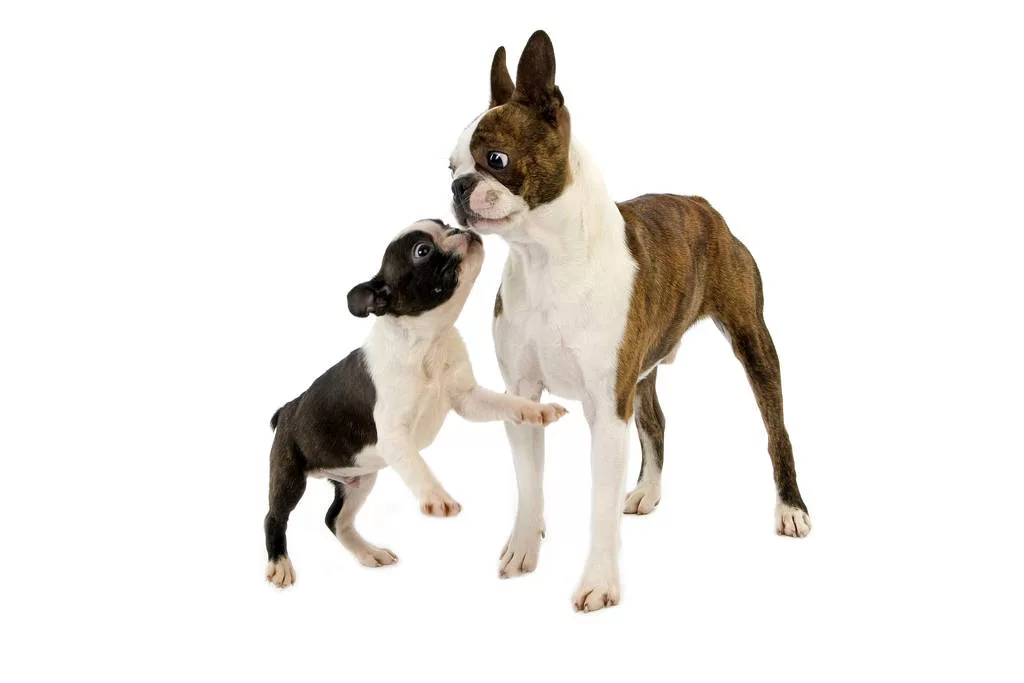
3. Do Boston Terriers Grow Out of Nipping and Biting?
One common concern among Boston Terrier owners is whether their adorable, yet occasionally nippy, puppies will eventually outgrow this behavior. The good news is that, in most cases, Boston Terriers naturally progress beyond nipping and biting as they mature and transition into adulthood. Here’s a more detailed look at this crucial phase of a Boston Terrier’s development:
Puppy Teething Phase:
Puppies of all breeds, including Boston Terriers, undergo a teething phase. This teething process usually commences at around three weeks of age and continues until they are about six months old. During this period, puppies experience discomfort as their baby teeth are replaced by adult teeth. This discomfort often compels them to chew and nip, providing relief from the pain and discomfort associated with teething. It’s important to recognize that their nipping and chewing during teething are not acts of aggression but are primarily driven by the need for comfort.
Maturity and Behavioral Changes:
As Boston Terriers reach the age of six months and beyond, their adult teeth are fully developed, and the teething phase comes to an end. With this developmental milestone, many Boston Terriers naturally display a reduced desire to chew or bite. Their mouths are no longer subjected to the aches and pains associated with teething, leading to less frequent nipping behavior.
Training and Socialization:
While Boston Terriers do tend to grow out of nipping and biting naturally, responsible pet ownership and proper training can expedite this process. Consistent training and socialization play vital roles in teaching these affectionate pups appropriate behavior, especially during their formative months. By introducing them to various experiences and encouraging positive interactions, you can help guide your Boston Terrier towards becoming a well-adjusted and well-behaved adult dog.
Positive Reinforcement:
Employing positive reinforcement methods during training sessions can be highly effective. By rewarding your Boston Terrier for good behavior with praise and treats, you encourage them to continue exhibiting the desired conduct. This approach helps them understand which behaviors are acceptable and which are not.
Gradual Transition:
It’s essential to recognize that while many Boston Terriers do grow out of nipping and biting, the process is typically gradual. The intensity and frequency of nipping may lessen over time as they mature and become more comfortable with their surroundings. They will start to understand the boundaries for playful interactions.
Individual Variations:
It’s worth noting that each Boston Terrier is unique, and the rate at which they outgrow nipping and biting can vary. Some may quickly adapt to desired behavior through consistent training, while others might take a little longer. It’s important for pet owners to remain patient and persistent throughout the process.
In summary, Boston Terriers are likely to outgrow nipping and biting behavior as they mature, primarily because they experience less teething-related discomfort. However, responsible pet ownership, training, and socialization practices can significantly contribute to a smoother and quicker transition. By employing positive reinforcement and patiently guiding your Boston Terrier, you can help them become a well-mannered and joyful companion who has left their nippy puppy days behind.

4. What NOT to Do to Stop the Biting:
Ensuring that your Boston Terrier transitions smoothly through their nipping and biting phase requires a nuanced approach. While you may be eager to stop this behavior, there are certain actions you should avoid. Here are essential guidelines on what not to do when addressing your Boston Terrier’s nipping and biting:
Avoid Harsh Punishment or Physical Discipline:
Resorting to harsh punishment or physical discipline is a counterproductive measure. Such actions can have detrimental effects on your Boston Terrier’s mental and emotional well-being. Instead of curbing the nipping, it might exacerbate the situation by instilling fear and anxiety in your pet. This can lead to a breakdown of trust between you and your furry friend, which is an outcome you undoubtedly want to avoid.
Refrain from Screaming or Yelling:
Yelling or screaming at your puppy when they nip is equally ineffective. Boston Terriers, like other dog breeds, may misinterpret this response and perceive it as an invitation to engage in a more spirited and boisterous play. This reaction may reinforce the undesirable behavior rather than deterring it. Yelling can also cause anxiety in your puppy, further complicating the training process.
Steer Clear of Aggressive Behavior:
Never, under any circumstances, employ any form of aggressive behavior towards your Boston Terrier. Aggression, whether physical or verbal, can severely damage the bond and relationship between you and your pet. It creates an atmosphere of fear and mistrust, which is not conducive to effective training or a loving companionship. Your Boston Terrier should feel safe and secure in your presence, and aggression undermines this sense of security.
Alternative Approaches to Encourage Good Behavior:
Instead of resorting to punitive measures, consider these alternative approaches to encourage good behavior and address nipping and biting effectively:
- Positive Reinforcement: Utilize positive reinforcement techniques, such as rewarding your Boston Terrier with treats, affection, and praise when they display appropriate behavior. This method helps them understand which actions are desirable and encourages them to repeat those actions.
- Training and Socialization: Enroll your puppy in training classes and engage in socialization activities. These experiences expose them to various situations and help them learn how to interact with other dogs and people. Properly socialized Boston Terriers tend to exhibit better behavior and reduced nipping tendencies.
- Provide Chew Toys: Offer a variety of safe and appropriate chew toys to your Boston Terrier. This can redirect their chewing and nipping instincts towards toys rather than human hands or belongings.
- Time-Outs: If your puppy’s nipping becomes too exuberant, consider giving them a brief time-out in a designated area, separate from the action. This helps them understand that excessive nipping results in a pause in playtime.
- Consult a Professional: If your Boston Terrier’s nipping behavior continues to be problematic, it may be advisable to seek guidance from a professional dog trainer or behaviorist. They can offer personalized strategies to address the issue and provide tailored training plans.
In conclusion, avoiding harsh punishment, screaming, or aggressive behavior is paramount when addressing your Boston Terrier’s nipping and biting. Instead, opt for positive reinforcement, training, and socialization techniques that foster a loving and respectful relationship between you and your pet. By employing these methods, you can effectively guide your Boston Terrier toward becoming a well-behaved and delightful companion.

5. Should a Boston Terrier Be Disciplined for Biting? How So?
Disciplining a Boston Terrier for biting or nipping is a topic that requires careful consideration. While it’s essential to guide your pup toward better behavior, effective discipline should be based on positive reinforcement, respect, and communication rather than punishment. Here’s a closer look at how to discipline your Boston Terrier when they exhibit nipping behavior:
1. Focus on Positive Reinforcement:
The foundation of disciplining your Boston Terrier should be rooted in positive reinforcement. This approach emphasizes rewarding good behavior rather than punishing undesirable actions. Positive reinforcement helps your dog understand which behaviors are acceptable and encourages them to repeat those actions. When your Boston Terrier displays the desired behavior, such as refraining from nipping, offer immediate and enthusiastic praise. Use a warm and encouraging tone to communicate your satisfaction.
2. Utilize Reward-Based Training:
Reward-based training involves offering treats or affection as a reward for your Boston Terrier’s positive actions. Whenever your pup refrains from biting or nipping, reward them with a small treat or affectionate attention. This method creates a strong association between good behavior and pleasant outcomes, making your dog more likely to continue exhibiting that behavior.
3. Firm but Gentle Commands:
When your Boston Terrier nips, use firm but gentle commands to communicate that this behavior is not acceptable. For example, use a command like “No” or “Gentle” in a calm and composed tone. The key is to convey your message without resorting to anger or frustration. Boston Terriers respond well to clear and consistent commands, so ensure that all family members use the same phrases and tones.
4. Time-Outs:
In certain situations where your Boston Terrier’s nipping becomes too enthusiastic or frequent, consider implementing a brief time-out as a form of discipline. This involves separating your pup from the play or interaction for a short period. Time-outs help your dog understand that excessive nipping leads to a temporary pause in playtime. It’s a mild but effective method to discourage unwanted behavior.
5. Consistency is Key:
Consistency is crucial when disciplining your Boston Terrier for biting. Ensure that every member of your household follows the same set of rules and enforces consistent disciplinary measures. This unified approach will help your pup understand what is expected and minimize confusion.
6. Seek Professional Guidance:
If your Boston Terrier’s nipping behavior persists or becomes problematic, it may be advisable to consult with a professional dog trainer or behaviorist. These experts can provide you with personalized guidance, tailored training plans, and additional strategies to address the issue effectively.
In summary, when disciplining your Boston Terrier for biting, it’s essential to maintain a positive and respectful approach. Emphasize positive reinforcement, reward-based training, and consistent, firm but gentle commands. By employing these techniques, you can guide your Boston Terrier toward well-behaved and enjoyable companionship while fostering a loving and harmonious relationship.

6. What If There Are Children Around?
Introducing a Boston Terrier into a household with children can be a delightful experience, fostering companionship and teaching valuable lessons in responsibility and empathy. However, it’s essential to ensure a safe and harmonious environment for both the dog and the children. Here are some crucial considerations when Boston Terriers and children share a living space:
Supervise Interactions:
One of the most critical aspects of fostering a positive relationship between your Boston Terrier and children is active supervision. Always be present and attentive when your dog and children are together, especially during the initial stages of their interaction. This close supervision allows you to intervene promptly if necessary, ensuring safety for all parties involved.
Teach Respect and Gentle Kindness:
Teaching children to treat the Boston Terrier with respect and gentle kindness is a fundamental lesson in pet ownership. This involves explaining to kids that dogs have feelings, just like humans do, and they should be treated with care and empathy. Emphasize the importance of gentle petting and respectful behavior, discouraging any form of rough play.
Encourage Children’s Participation:
Incorporate children into the training process and make them feel like an integral part of the dog’s life. Encourage kids to participate in rewarding good behavior with treats and affection. This involvement not only strengthens the bond between the dog and children but also instills a sense of responsibility and empathy in young minds.
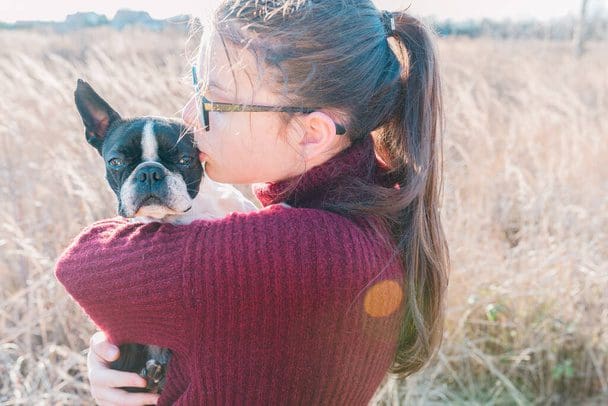
Educate About Boundaries:
Teach children about the importance of setting boundaries with the Boston Terrier. Make it clear which areas are off-limits for the dog, and explain the significance of respecting these boundaries. Also, help children understand when it’s appropriate to engage in play and when the dog needs some quiet time.
Socialization:
Boston Terriers are generally sociable and thrive on interaction with various people, including children. Gradual and positive socialization is vital, especially for puppies. Organize play dates and interactions with other dogs and children, always ensuring a controlled and safe environment.
Body Language Awareness:
Educate children about recognizing a dog’s body language and cues. Teach them to understand when the dog may want to be left alone, when they are excited, or when they are relaxed. This knowledge helps children interpret the dog’s emotions and respond accordingly.
Set a Positive Example:
As a parent or guardian, setting a positive example when interacting with the Boston Terrier is crucial. Children often emulate the behavior they observe. Demonstrating kindness, respect, and gentle treatment of the dog reinforces these values in your children.
Encourage Communication:
Foster open communication with your children about their experiences and observations with the Boston Terrier. Encourage them to express any concerns or questions they may have regarding the dog’s behavior. This open dialogue helps ensure a positive and safe environment for both the dog and the children.
In summary, supervising interactions, teaching respect and kindness, involving children in the training process, and educating them about boundaries and body language are all essential factors when Boston Terriers and children coexist in a household. These measures create a harmonious and safe environment, allowing your children to develop empathy, responsibility, and a deep bond with their furry friend while ensuring the well-being of the dog.

7. Products to Help Stop Biting
- Puppy Teething Toys: Providing appropriate chew toys can help soothe their gums during the teething phase.
- Bitter Spray: Applying a pet-safe, bitter-tasting spray to items they shouldn’t chew can deter unwanted behavior.
- Training Aids: Use training tools like clickers, harnesses, or leashes to reinforce good behavior.
- Professional Training: Enroll your Boston Terrier in obedience classes or seek the assistance of a professional dog trainer if necessary.

8. How Socialization Helps Stop Biting
Socialization is a vital component of raising a well-adjusted and friendly Boston Terrier. It involves exposing your dog to various situations, environments, people, and other dogs from an early age. Proper socialization can significantly contribute to reducing anxiety and minimizing biting tendencies in your pet. Here’s why it’s essential and how to achieve it:
Why Socialization Matters:
- Reduced Anxiety: Socialization helps Boston Terriers become more comfortable in different situations. When exposed to various stimuli and environments, they learn to adapt and feel less anxious in unfamiliar settings.
- Improved Behavior: Well-socialized dogs tend to exhibit better behavior. They are less likely to react aggressively or defensively when confronted with new experiences, people, or animals.
- Enhanced Communication Skills: Through socialization, dogs develop better communication skills. They learn how to interact with other dogs and people, read body language, and respond appropriately, reducing the likelihood of misunderstandings that could lead to aggression.
- Enhanced Confidence: Socialization fosters self-assurance in Boston Terriers. Dogs that have been exposed to a range of experiences tend to be more confident and less prone to fear-based behaviors.
How to Socialize Your Boston Terrier:
- Start Early: The critical period for socialization is between 3 and 14 weeks of age. During this time, puppies are more receptive to new experiences. However, socialization can and should continue throughout their lives.
- Positive Exposure: When introducing your Boston Terrier to new situations or people, ensure that the experiences are positive. Use treats, praise, and affection to reward your dog for calm and confident behavior.
- Variety of Environments: Expose your dog to a variety of environments such as parks, neighborhoods, busy streets, pet stores, and different types of terrain. This variety helps them adapt to different surroundings.
- Meeting New People: Encourage your Boston Terrier to meet various people, including different ages, genders, and appearances. Meeting strangers is an excellent way to teach them that new individuals are not a threat.
- Interaction with Other Dogs: Arrange play dates with other dogs to allow your Boston Terrier to interact with different breeds, sizes, and temperaments. This interaction can teach them how to communicate effectively with other dogs.
- Exposure to Sounds: Gradually introduce your dog to various sounds, such as traffic noise, sirens, and household appliances. This can help reduce sensitivity to loud or sudden noises.
- Obedience Training: Enroll your Boston Terrier in obedience classes. Not only does this provide structured training, but it also exposes them to different dogs and people in a controlled environment.
- Regular Outings: Take your Boston Terrier on regular outings to ensure they are comfortable in different settings. These outings should be enjoyable and filled with positive experiences.
- Consistency: Socialization is an ongoing process. Continue to expose your Boston Terrier to new situations, people, and dogs throughout their life. Regular socialization reinforces positive behavior.
- Body Language Awareness: While socializing, teach your Boston Terrier to recognize and interpret the body language of other dogs. This knowledge helps them understand when play is welcome and when it’s time to back off.
- Watch for Stress Signals: Keep a close eye on your dog’s stress signals during socialization. If they exhibit signs of fear, anxiety, or aggression, remove them from the situation and consult with a professional dog trainer or behaviorist.
Incorporating socialization into your Boston Terrier’s routine is an investment in their well-being and the safety of those around them. By gradually exposing your dog to a variety of environments, people, and animals in a positive and controlled manner, you can significantly reduce anxiety and biting tendencies, ensuring a happy and well-adjusted companion.

9. How a Consistent Routine Can Stop the Biting
Establishing and maintaining a consistent daily routine is a fundamental aspect of raising a well-behaved Boston Terrier. Dogs thrive on predictability, and a structured routine provides them with a sense of security, stability, and comfort. By adhering to a consistent schedule, you can reduce anxiety in your Boston Terrier, which, in turn, can minimize biting tendencies. Here’s how a consistent routine benefits your dog and some tips on creating one:
Why a Consistent Routine Matters:
- Anxiety Reduction: Predictable daily routines help your Boston Terrier know what to expect. This sense of predictability can reduce anxiety, as dogs feel more secure when they know when they’ll be fed, exercised, and have playtime.
- Improved Behavior: When dogs experience less anxiety, they are less likely to exhibit stress-related behaviors, such as excessive nipping or biting. Consistency can promote better overall behavior.
- Healthy Habits: A routine ensures that your dog receives essential care consistently, including regular meals, exercise, and potty breaks, promoting their physical and mental well-being.
How to Create a Consistent Routine:
- Set a Fixed Schedule: Establish specific times for feeding, walks, play, training, and bedtime. Stick to this schedule as closely as possible every day.
- Feed at Regular Times: Boston Terriers should be fed at regular intervals. This not only regulates their digestion but also helps them anticipate meal times.
- Scheduled Potty Breaks: Take your dog out for potty breaks at the same times each day, reducing the likelihood of accidents in the house.
- Exercise Routine: Incorporate daily exercise into your Boston Terrier’s schedule, such as morning walks and play sessions. Ensure they get ample physical and mental stimulation.
- Designate Playtime: Dedicate specific periods for play and interaction with your dog. Engaging toys and games can be part of this playtime.
- Training Sessions: Include short training sessions in your daily routine. Consistency in training reinforces commands and encourages good behavior.
- Regular Bedtime: Establish a consistent bedtime routine, which may involve a final potty break and some quiet time to help your Boston Terrier wind down.
- Provide Mental Stimulation: Boston Terriers are intelligent dogs. Include activities that challenge their minds, such as puzzle toys and obedience training.
- Social Interaction: Make time for socializing your Boston Terrier with other dogs or humans. This can be part of their daily routine.
- Family Involvement: Ensure that all family members are on board with the daily routine. Consistency is crucial, and everyone in the household should follow the same schedule.
- Be Patient: It may take some time for your Boston Terrier to adjust to a new routine. Be patient and provide positive reinforcement for good behavior.
- Adaptability: While consistency is essential, be open to making small adjustments to the routine as needed. Life can be unpredictable, but strive to maintain stability as much as possible.
- Monitor Behavior: Keep an eye on your Boston Terrier’s behavior as you establish the routine. Over time, you should see a decrease in anxiety-related behaviors, such as nipping and biting.
By maintaining a consistent daily routine for your Boston Terrier, you provide them with the stability and predictability they need to thrive. This predictability reduces anxiety and can help minimize biting tendencies, resulting in a happier and more well-behaved canine companion. Remember that patience and positive reinforcement play key roles in the success of your dog’s routine.
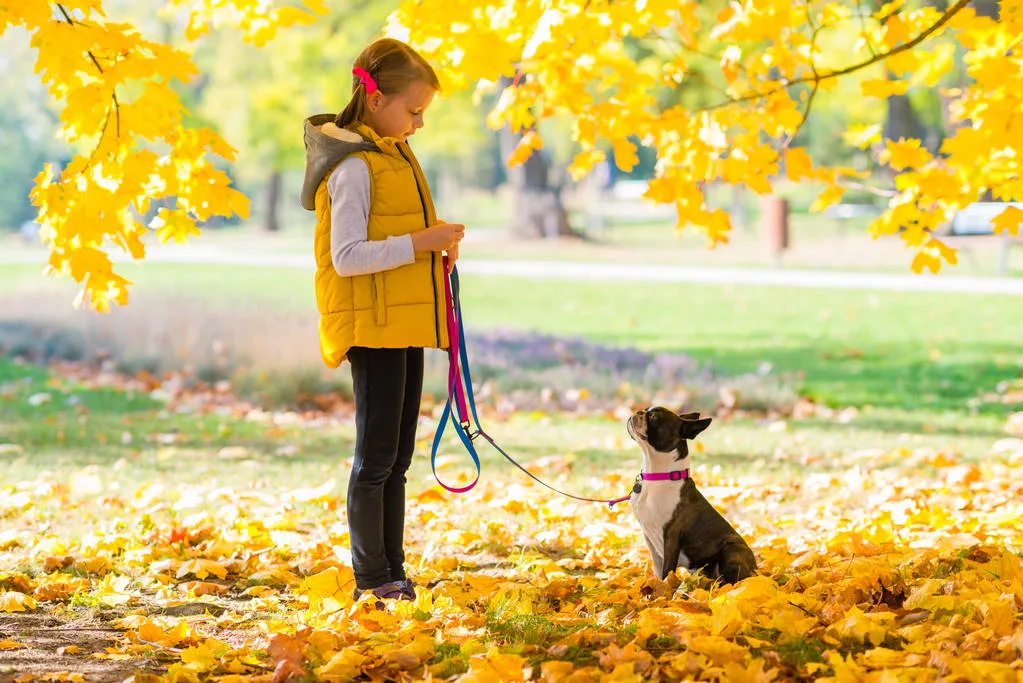
10. Seek Professional Advice
If your Boston Terrier’s biting behavior continues despite your best efforts, or if you’re uncertain about how to address this issue, it’s wise to seek professional guidance. Professionals such as veterinarians and dog trainers can provide valuable insights and assistance to help you manage and ultimately eliminate your Boston Terrier’s biting habits. Here’s why and how to seek professional advice effectively:
Why Professional Advice Matters:
- Expertise: Veterinarians and professional dog trainers possess the knowledge and expertise needed to assess your Boston Terrier’s behavior accurately. They can identify the root causes of biting and recommend appropriate strategies for correction.
- Individualized Solutions: Each Boston Terrier is unique, and what works for one dog may not work for another. Professionals can tailor their advice to your specific dog’s needs, considering factors like age, temperament, and history.
- Safety: Biting can be a serious issue, especially if it’s aggressive or potentially harmful. Professionals can ensure the safety of both your dog and those around them while addressing the problem effectively.
How to Seek Professional Advice:
- Consult Your Veterinarian: If your Boston Terrier’s biting seems related to health issues, pain, or discomfort, start by consulting your veterinarian. Rule out any underlying medical causes and ask for recommendations to address the behavior.
- Find a Certified Dog Trainer: Look for a certified and experienced dog trainer who specializes in behavior modification. Seek recommendations from friends, family, or local pet owners, or search online for qualified trainers in your area.
- Initial Assessment: The professional will assess your dog’s behavior, typically through an initial consultation. During this assessment, they may ask questions about the biting behavior, your dog’s daily routine, and their environment.
- Customized Training Plan: Based on their assessment, the trainer or veterinarian will create a customized training plan to address the biting problem. This plan may involve various techniques, positive reinforcement methods, and behavior modification strategies.
- Consistent Training: Follow the professional’s recommendations consistently. Attend training sessions, practice exercises at home, and adhere to their advice regarding your Boston Terrier’s behavior.
- Regular Follow-ups: The professional may schedule regular follow-up appointments to monitor your dog’s progress. Be sure to communicate openly about any changes or challenges you’ve encountered.
- Group Training Classes: In some cases, attending group training classes with your Boston Terrier can be beneficial. These classes offer socialization opportunities and a structured environment for behavior correction.
- Exercise Patience: Behavior modification takes time, so be patient throughout the process. Celebrate small victories and remain committed to the training plan.
- Avoid Negative Reinforcement: While seeking professional advice, ensure that the training methods employed focus on positive reinforcement and reward-based techniques. Avoid any form of punishment that could exacerbate the issue or harm your bond with your Boston Terrier.
- Monitor Progress: Keep a record of your Boston Terrier’s progress as you implement the professional’s recommendations. This documentation can help track improvements and identify any areas that require further attention.
- Be Open to Adaptation: Be open to adapting your approach based on the advice of the professional. If a particular technique doesn’t yield results, discuss alternative strategies with them.
- Safety Measures: If your Boston Terrier’s biting poses safety risks to individuals or other pets, take necessary precautions to prevent potential harm while undergoing training.
By seeking professional advice, you demonstrate your commitment to addressing your Boston Terrier’s biting behavior effectively. Professionals can offer valuable insights, customized training plans, and safety measures to ensure a successful resolution. This collaborative effort between you, your dog, and the experts will promote a happier and healthier relationship between you and your Boston Terrier.

Conclusion
Understanding and addressing Boston Terrier nipping and biting is crucial for both the well-being of your pet and the harmonious relationship between you and your furry friend. By using positive reinforcement, consistent training, and appropriate products, you can help your Boston Terrier overcome this behavior as they grow into a well-behaved and beloved family companion. Remember, patience and understanding go a long way in helping your Boston Terrier become a well-adjusted and happy member of your household.

https://terrierhub.com/boston-terrier-biting/
This post contains affiliate links. I earn from qualifying Amazon purchases.
